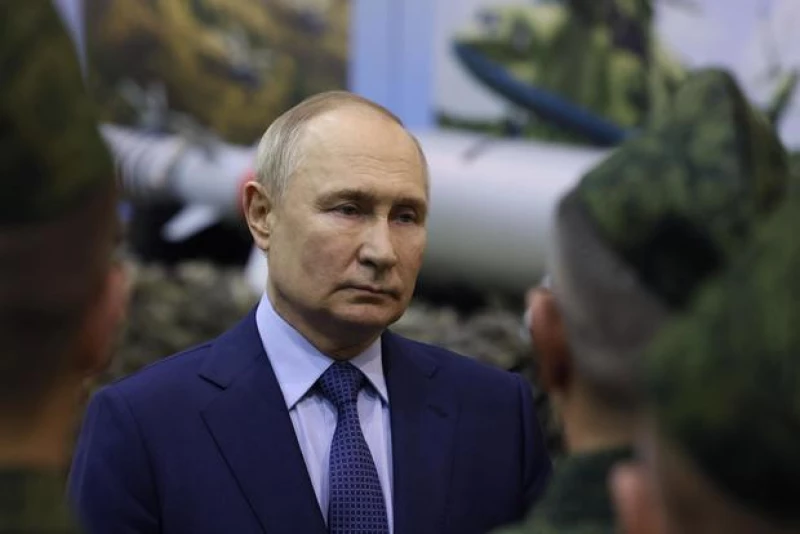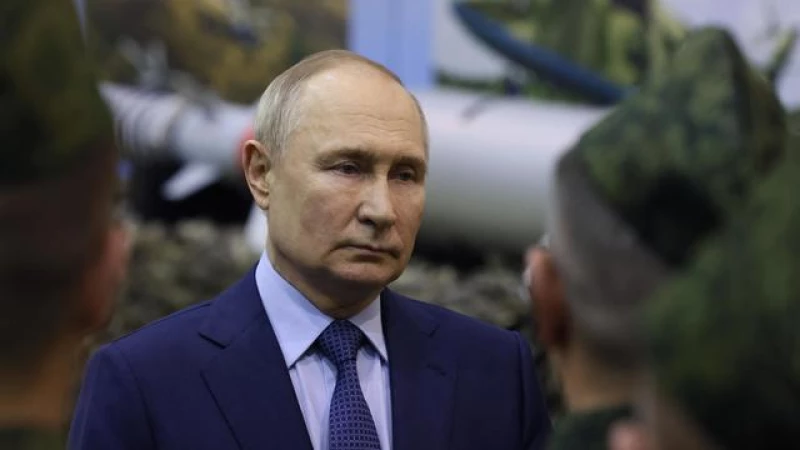Russia announced on Monday its plans to conduct drills simulating the use of battlefield nuclear weapons, also known as tactical nuclear weapons, in response to escalating tensions following remarks by senior Western officials regarding the potential for increased involvement in the conflict in Ukraine.
The announcement coincided with the upcoming inauguration of Russian President Vladimir Putin for a fifth term and the approaching Victory Day, a significant secular holiday in Russia commemorating the country's victory over Nazi Germany in World War II.
The Defense Ministry stated that the drills were a response to "provocative statements and threats made by certain Western officials concerning the Russian Federation."

This marks the first public announcement of drills involving tactical nuclear weapons by Russia, as its strategic nuclear forces routinely conduct exercises. Tactical nuclear weapons encompass air bombs, warheads for short-range missiles, and artillery munitions designed for battlefield use. They are of lower yield compared to the large warheads on intercontinental ballistic missiles, which are intended for city-wide destruction.
The Russian announcement was a warning to Ukraine's Western allies about becoming more deeply involved in the 2-year-old war. Ukraine's President Volodymyr Zelenskyy and some of his Western partners have warned that if Russia is not stopped, the conflict could spill beyond Ukraine into a war between NATO and Russia.
French President Emmanuel Macron repeated last week that he doesn't exclude sending troops to Ukraine, and U.K. Foreign Secretary David Cameron said Kyiv's forces will be able to use British long-range weapons to strike targets inside Russia. Some other NATO countries providing weapons to Kyiv have balked at that possibility.
The Kremlin branded those comments dangerous, heightening tension between Russia and NATO. The war already has placed significant strain on relations between Moscow and the West.
- Poland "ready" to host NATO nuclear weapons, president says
Kremlin spokesman Dmitry Peskov said Monday that Macron's recent statement and other remarks by British and U.S. officials had prompted the nuclear drills.
"It's a new round of escalation," Peskov said, referring to what the Kremlin regarded as provocative statements. "It's unprecedented and requires special attention and special measures."
Dmitry Medvedev, the deputy head of Russia's Security Council that's chaired by Putin, said that the comments by Macron and Cameron risked pushing the nuclear-armed world toward a "global catastrophe."
Europe's Military Support for Ukraine Sparks Nuclear Saber-Rattling
Reports indicate that Europe's military support for Ukraine has once again led to nuclear saber-rattling. This comes after the U.K. decided to supply Ukraine with armor-piercing shells containing depleted uranium. In response, Putin threatened to deploy tactical nuclear weapons in Belarus, Ukraine's neighboring country. Furthermore, a close ally of Putin's in Belarus claimed, without evidence, that Russian nuclear weapons "three times more powerful" than those used in World War II had been stationed there.
The Russian defense ministry announced that the exercise, slated to increase the readiness of non-strategic nuclear forces, was ordered by Putin. The maneuvers were set to involve missile units from the Southern Military District, which shares a border with Ukraine, as well as the air force and navy.
Ukrainian response to the Russian announcement was muted, with the spokesman for the Military Intelligence agency dismissing it as typical nuclear blackmail from Putin's regime. Meanwhile, Western officials have accused Russia of provoking a wider war through its actions. NATO countries expressed deep concern over what they described as a series of hybrid activities on NATO soil, attributing them to Moscow and labeling them a security threat.
In response to these allegations, Kremlin spokesperson Peskov rejected them as baseless accusations against Russia. Germany, on the other hand, announced the temporary recall of its ambassador to Russia for consultations in Berlin following an alleged cyberattack on Chancellor Olaf Scholz's party.
Reports from local authorities in Russia's Belgorod region indicate that Ukrainian drones struck two vehicles on Monday, resulting in the deaths of six individuals and injuries to 35 others, including two children. This area has been a target of attacks by Kyiv's forces in recent months.
Among the vehicles hit was a minibus transporting farm workers, as confirmed by Belgorod Governor Vyacheslav Gladkov.
While facing constraints in terms of troops and ammunition after years of conflict, Ukraine's army has resorted to utilizing its long-range capabilities to strike deep into Russian territory.
Throughout the ongoing conflict, Russia has also heavily relied on long-range weaponry such as missiles, artillery, and drones to inflict damage on Ukraine.
Continuing their assault on Ukraine's infrastructure, Russian forces conducted a nighttime drone attack on the energy grid in the northern Sumy region, resulting in power outages in multiple towns and villages.
Ukraine's air force reported intercepting 12 out of the 13 Shahed drones deployed by Russia in the Sumy region overnight.







